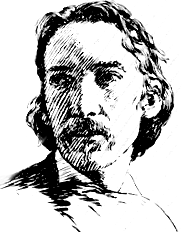Fables
By Robert Louis Stevenson

II. - The Sinking Ship.
“SIR,” said the first lieutenant, bursting into the Captain’s cabin, “the ship is going down.”
“Very well, Mr. Spoker,” said the Captain; “but that is no reason for going about half-shaved. Exercise your mind a moment, Mr. Spoker, and you will see that to the philosophic eye there is nothing new in our position: the ship (if she is to go down at all) may be said to have been going down since she was launched.”
“She is settling fast,” said the first lieutenant, as he returned from shaving.
“Fast, Mr. Spoker?” asked the Captain. “The expression is a strange one, for time (if you will think of it) is only relative.”
“Sir,” said the lieutenant, “I think it is scarcely worth while to embark in such a discussion when we shall all be in Davy Jones’s Locker in ten minutes.”
“By parity of reasoning,” returned the Captain gently, “it would never be worth while to begin any inquiry of importance; the odds are always overwhelming that we must die before we shall have brought it to an end. You have not considered, Mr. Spoker, the situation of man,” said the Captain, smiling, and shaking his head.
“I am much more engaged in considering the position of the ship,” said Mr. Spoker.
“Spoken like a good officer,” replied the Captain, laying his hand on the lieutenant’s shoulder.
On deck they found the men had broken into the spirit-room, and were fast getting drunk.
“My men,” said the Captain, “there is no sense in this. The ship is going down, you will tell me, in ten minutes: well, and what then? To the philosophic eye, there is nothing new in our position. All our lives long, we may have been about to break a blood-vessel or to be struck by lightning, not merely in ten minutes, but in ten seconds; and that has not prevented us from eating dinner, no, nor from putting money in the Savings Bank. I assure you, with my hand on my heart, I fail to comprehend your attitude.”
The men were already too far gone to pay much heed.
“This is a very painful sight, Mr. Spoker,” said the Captain.
“And yet to the philosophic eye, or whatever it is,” replied the first lieutenant, “they may be said to have been getting drunk since they came aboard.”
“I do not know if you always follow my thought, Mr. Spoker,” returned the Captain gently. “But let us proceed.”
In the powder magazine they found an old salt smoking his pipe.
“Good God,” cried the Captain, “what are you about?”
“Well, sir,” said the old salt, apologetically, “they told me as she were going down.”
“And suppose she were?” said the Captain. “To the philosophic eye, there would be nothing new in our position. Life, my old shipmate, life, at any moment and in any view, is as dangerous as a sinking ship; and yet it is man’s handsome fashion to carry umbrellas, to wear indiarubber over-shoes, to begin vast works, and to conduct himself in every way as if he might hope to be eternal. And for my own poor part I should despise the man who, even on board a sinking ship, should omit to take a pill or to wind up his watch. That, my friend, would not be the human attitude.”
“I beg pardon, sir,” said Mr. Spoker. “But what is precisely the difference between shaving in a sinking ship and smoking in a powder magazine?”
“Or doing anything at all in any conceivable circumstances?” cried the Captain. “Perfectly conclusive; give me a cigar!”
Two minutes afterwards the ship blew up with a glorious detonation.
 Continue...
Continue...![[Buy at Amazon]](../images.amazon.com/images/P/159572057X.01.MZZZZZZZ.jpg)